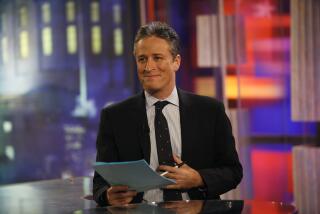Pentagon kills Early Bird daily news digest

- Share via
WASHINGTON — The Pentagon’s Early Bird, an influential daily digest of news and opinion articles about the military that began early in the Cold War, died Friday, another victim of digital news and the government’s desire to control the flow of information.
“It had become too big,” said Col. Steve Warren, the head of the Pentagon’s press office, who terminated the 65-year-old clip service. “It had become too powerful, and I believe it had the tendency to take a small story and purely by accident turn it into a crisis.”
It did that and far more. Sent out at sunrise each day, it was scrutinized by Defense secretaries and senior generals, as well as by White House officials, members of Congress, defense contractors and diplomats, as well as officers on military bases and outposts around the world. It was said to reach more than 1 million readers a day.
When Donald H. Rumsfeld headed the Pentagon under President George W. Bush, he used the Early Bird to joust with the media. His staff listed embarrassing corrections culled from mainstream newspapers at the top of the Early Bird every morning.
A juicy scoop in the Early Bird could reverberate through the Pentagon’s hallways, especially if it caught a senior official unawares. It could make or break a military career, and was read closely by almost everyone who wanted to know what was going on in the Defense Department and could get their name on the distribution list.
That list had expanded over the years, starting in 1948, when a hand-copied compilation of news stories began circulating to top officials; to the mid-1960s, when it was known as the Yellow Bird because it was printed on yellow paper; to 1989, when it became the official daily news summary of the Pentagon’s public affairs office.
The arrival of faxes and then email greatly expanded its circulation, enabling commanders far away to demand a copy every morning. But the Internet also laid the groundwork for its demise — ironically by making it more influential.
Some news organizations grumbled that the Pentagon was reprinting their stories but not linking to their websites, a potential copyright violation that became more serious as newspapers struggled to hold readers and stay profitable.
Reporters covering the Pentagon would pester its press shop all day about a story in the Early Bird, a source of annoyance to an office that thinks of its job as controlling the message.
Senior Pentagon officials sent Warren’s offices daily requests to add a positive story — or omit a negative one, he said. At the same time, its original function as a single news source for commanders was eclipsed as news flooded in nonstop from cable TV, phones, laptops and other devices.
“If a positive story about you or your unit made it into the Early Bird, it was a source of pride,” said Army Maj. Joe Buccino, the public affairs officer at Ft. Bliss in Texas. “But I think it’s become less and less read because now there are other venues to follow media coverage that are available to a commander.”
Warren suspended the Early Bird during the 16-day government shutdown last month, when the two Pentagon employees who compiled it every day were furloughed.
Warren decided to keep it closed once the shutdown ended. The office received dozens of emails, including one from the White House, asking when publication would resume. On Friday, he made the announcement that it would not.
His office will continue to compile news stories for Defense Secretary Chuck Hagel and a small group of other top officials — the original mission of the Early Bird.
“This decision was not taken lightly,” Warren said. “The biggest downside is that the Early Bird did create a community. Everybody was reading the same thing. Everybody agreed on what the news was. It had a unifying effect in the department, for good and bad.”
More to Read
Sign up for Essential California
The most important California stories and recommendations in your inbox every morning.
You may occasionally receive promotional content from the Los Angeles Times.











